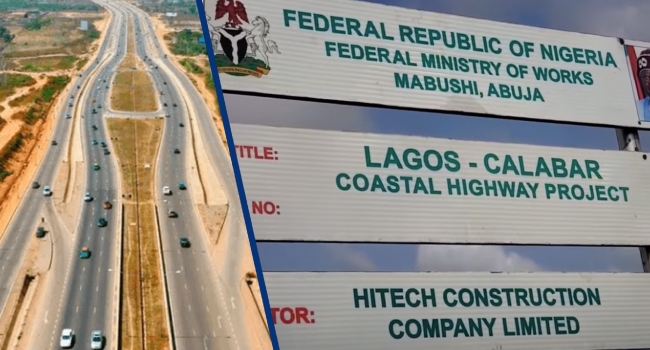
5 things to know about the Lagos-Calabar coastal highway
By Ifeoluwa Adebayo
The Lagos-Calabar coastal highway is a massive sectional construction, aiming to be the largest infrastructure project in Nigeria’s history.
It is designed by the Hitech construction company Limited, spanning 700 kilometres (435 miles) to connect Lagos with Calabar.
The construction, which commenced in March 2024, was announced by Sen. David Umahi, minister of works during a meeting at Eko Atlantic (Chainage Zero) and Eleko inside (Chainage 47.4 kilometres) in Lagos on Thursday.
However, the project started in Lagos and will expand to nine states in Nigeria, moving down to Calabar and Porthacourt.
Here are five things to know about the Lagos-Calabar coastal highway.
1) The construction is planned to run for a period of 8 years, with the highway being built in phases that align with president’s two terms.
The first section is a 47-kilometer extension from Ahmadu Bello. The way to the Lekki Deep Seaport in Lagos began in March 2024 and will be completed in 36 months.
However, the initial 13 kilometre highway project has been completed with the final concrete pavement. The second section will extend from Lekki Deep Seaport to the boundary between Ogun and Ondo state.
Dave Umahi, minister of works, disclosed these during his appearance on Channel’s TV on Thursday. He further said that the second phase of the project has received approval from the Bureau of Public Enterprises (BPE) and will start in July, pending the approvals from the Federal Executive Council (FEC).
2) About 750 houses were marked for demolition at the construction areas before the project started. The federal government paid a compensation amount of N2.75 billion to property owners whose properties were within the first 3 kilometres of the Lagos-Calabar coastal highway project.
3) The Lagos-Calabar coastal highway was reverted to the gazetted alignment between kilometres 16 and 25 to save submarine cables.
The planned infrastructure generated controversy between Nigerians and the government due to the effect it had on Landmark, one of the beaches affected by the highway along the Atlantic Ocean beachfront in Lagos.
However, MTN, 2Africa and the Group CEO of Machine and Equipment Consulting of Africa highlighted that one of the cables for 2Africa cuts across 33 countries connecting about three billion people for 17 years is located at the Atlantic Ocean. They also have a mega IPP, which is to provide power to the 2Africa cable and the WACS cable.
4) The highway is envisioned as a game-changer for Nigeria. It hopes to boost economic activity by facilitating trade and travel along the coast and fostering the economy of foreign direct investment (FDI).
It also aims to improve GDP growth, stimulate momentum for industrial growth, and improve connectivity in various sectors, from agriculture and manufacturing to tourism and commerce.
5) The long-term success of the Lagos-Calabar Coastal Highway hinges on various factors but symbolises hope, unity, and prosperity for Nigerians.
It addresses environmental concerns, ensuring transparency in funding, and creating sustainable development plans for connected communities that will be crucial for its positive impact.




